By Philip Carter
British History Online has recently digitised and published the records of 22,000 history PhDs from UK and Irish universities. The records cover research degrees awarded between 1970 and 2014, drawn from the IHR’s annual print catalogues of recently completed PhDs. This latest set of records complements an existing BHO series covering degrees awarded 1901-1970 which was published online in 2018.
Together both sets provide opportunities to trace shifts and developments in historical research, and chart the role of individual historians—first as doctoral research students and then as supervisors.
Here, in the first of two posts, we outline these new records and some of their applications. Having published the records on BHO, we’re also making available the underlying data—enabling you to undertake your own research at scale. This data—released in a couple of weeks—will be the subject of a second blog post.
1. BHO thesis data, 1901-70
In 1930 the Institute of Historical Research began collecting information about the award of new doctorates in history. Each year to 1970, the IHR received details of recently completed research degrees (mainly PhDs but also BPhil, MPhil and MA degrees) granted by UK universities. In 1976 this data was published by the Institute in a single volume which supplemented the 40 years of IHR records with earlier PhD listings going back to 1901 and the origins of the modern historical profession.
In 2018 British History Online digitized and published this single volume, providing information on 7500 research degrees on topics in British, international and world history, from ancient Greece to post-1945 Europe. In keeping with BHO editorial policy, the 2018 digital edition replicated the structure and the content of the 1976 print publication. Under a top-level category such as ‘Britain: 1660-1832’, sub-sections group 70 years of PhDs by theme. For example:
BRITAIN: 1660-1832
–> Political History
- Foreign and colonial relations
- Radicalism and reform movements
- Political thought
–> Ecclesiastical History
- Church of England
- Protestant nonconformity
- Roman Catholicism
Within each sub-section, individual records provide information on a thesis title, the student, institution, degree type and date of award: e.g.
The political career of General Conway. Hilda I. Clark. Liverpool M.A. 1917
The impeachment of Warren Hastings. P.J. Marshall. Oxford D.Phil. 1962
The evangelical revival as reflected in the life and works of John William de la Fléchère (1729–85). W.C. Lockhart. Edinburgh Ph.D. 1936
2. BHO thesis data, 1970-2014
It’s to this existing collection that we now add a second BHO data set, covering History dissertations awarded between 1970 to 2014—principally PhDs though with some Masters theses.
Unlike the 1901-1970 print collection (which we had rekeyed to create a new digital edition), the set covering 1970 to 2014 already existed in database format. Each year History departments in the UK, and latterly the Republic of Ireland, were invited to supply us with information on their recently completed theses. This was added to the database and used annually to create a print record of the latest PhDs.
By 2014 our database held records for 22,000 theses which we’ve now extracted and converted to the format required for British History Online. As you’d expect, our data contains the same fields as for the earlier 1901-70 series; but it now also includes references to thesis supervisor/s—together with focused ‘index’ and broader ‘category’ terms which relate to the subject matter of an individual PhD.
BHO records for the new series, 1970-2014, display these additional fields in the following format:
Meanings of manhood in early modern England, with special reference to Cambridge, c.1560-1640. Shepard, Alexandra J.
Ph.D., Cambridge. (Hist.). Supervised by Wrightson, Keith E.
Chronological coverage: 1560–1640
Index terms: Cambridge; Manhood
Categories: 16th Century; 17th Century
The foiled quest for a democratic factory order: a study in factory relations in Petrograd during the Russian civil war, 1918-21. Lyu, Hansu
Ph.D., Essex. (Hist.). Supervised by Smith, Stephen A.
Chronological coverage: 1918–1921
Index terms: Union of Soviet Socialist Republics; Civil War, Russian (1918-21); Factory relations, in the U.S.S.R.; see also Russia; Petrograd, U.S.S.R.
To be a moudjahida in independent Algeria: itineraries and memories of women veterans of the War of Independence, 1954-62. Vince, Natalya
Ph.D., London. (Q.M. Hist.). Supervised by Jackson, Julian T.
Chronological coverage: 1954–1962
Index terms: Algerian War (1954-62); Women, in Algeria; Algeria
Categories: Gender and Women; Military/naval history; Social history; 20th Century
Given the annual print format in which this data originally appeared, individual theses for 1970-2014 are now listed by year of award; so while dates aren’t provided in the individual record, each thesis remains clearly connected to its year: in the case of the three examples above: 1996, 2000 and 2009.
The extra index terms within the 1970-2014 records originally featured as finding aids for the annual catalogues. With these terms now exposed in BHO, it becomes easier to locate sets of theses on common subject areas or periods, even when this may not be evident from searching the text of thousands of PhD titles. Knowing which classifications have been applied to a thesis helps you search more precisely for related theses, although we need to stress that the original (print) classification is not consistent or exhaustive and never has been.
Similarly it’s important to note that the data in this new set of records was submitted annually by History departments on request; where information was not supplied there are inevitable gaps in our records. While the 22,000 theses now listed on BHO comprise a significant and sizeable data set, it is certainly not a full listing of all UK doctorates in History. We believe that by being transparent about the data and its inconsistencies we’re helping our users make informed choices about how best to engage with our content.
Further guidance on how to search BHO is available on the Using British History Online page.
3. Five applications of BHO thesis data
How might we engage with the information in these 30,000 records, recording History theses 1901-2014? Here are five ideas.
i. Historians – before they were famous
At its simplest both BHO collections (theses 1901-1970 and 1970-2014) offer text searchable records by student and title. Thus it’s easy to: find the work of a young Geoffrey Elton (‘Thomas Cromwell: aspects of his administrative work’, London 1949) or Isabel de Madariaga (‘Anglo-Russian relations during the War of American Independence, 1778–83′, also London 1959). And equally to: identify the respective supervisors of Roy Porter (‘The making of the science of geology in Britain, 1660-1815’ Cambridge, 1975 – Martin Rudwick) and Helen Castor (‘The duchy of Lancaster in the Lancastrian polity, 1399-1461‘ Cambridge, 1993 – Christine M. Carpenter).
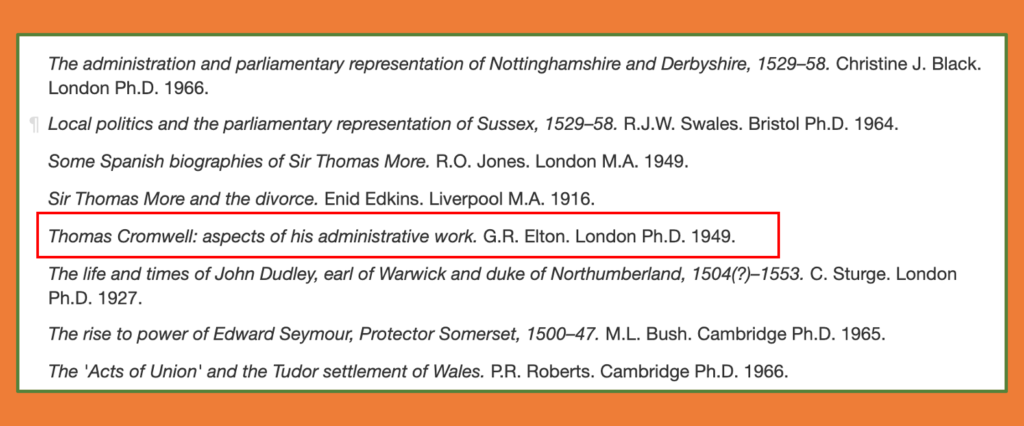
Text searching across titles is one way of identifying dissertations with a common subject area: thus ‘geology’ and ‘geological’ appear (in addition to Roy Porter’s PhD) in 13 thesis titles, 1901-2014*, while 581 dissertations in the field of ‘Modern Britain and Ireland’—and completed between 2000 and 2009—include reference to one of more of the terms: ‘gender’, ‘women’, ‘masculinity’.
*Each section of the BHO thesis listings, 1901-70 and 1970-2014 can be investigated separately, given its distinctive data structure. Equally you can search across shared fields for all records 1901-2014: by entering the term History Theses in the Title box and a search term in the Keywords box, you can search all theses at once. The 14 references to ‘Geology’ / ‘Geological’ as a search term appear in eight sections of the full series of theses.
ii. PhDs by university and student cohort
The BHO listings also highlight research activity within an institution. For example, in our data the earliest History PhD from Leicester University was awarded in 1959 (two years after that institution received its royal charter), with an additional 22 doctorates completed in the following decade. Between 1970 and 2014 a further 197 graduates in the BHO gained a PhD from the university.
Honing in by year also identifies fellow students by institution and/or by areas of research. Cambridge contemporaries of Roy Porter, working in the field of modern British history and also completing in 1975, include Michael Bentley, David Bebbington and Paul Bew. That year also saw David Abulafia—winner of the 2020 Wolfson Prize—receive his Cambridge PhD for ‘Commercial relations between the Norman kingdom of Sicily and the North Italian mercantile republics, 1116-91.’
iii. Pioneering women historians
Though our records aren’t coded by gender, the listings similarly highlight pioneering women researchers via browsing. Among those from the opening decade of the twentieth century are: Frances A. Collie, ‘The history and nature of the dowry among the ancient Greeks‘ (Wales M.A. 1905); Helen M. Cam, ‘A comparison of the local administration and law courts of the Carolingian empire with those of the West Saxon kings‘ (London M.A., 1909) and Laura H. Thraves, ‘The Gordon Riots, 1780’ (Liverpool M.A. 1910).


iv. Academic ‘family trees’
References to supervisors for many post-1970 records allow us to chart connections between historians: one of those first generation Leicester historians was the early modernist Margaret Spufford (1935-2014) whose MA (‘Rural Cambridgeshire, 1520–1680’, 1962) was followed by a PhD (‘People, land and literacy in 16th- and 17th-century Cambridgeshire‘, 1970). Ten of Spufford’s own PhD students are listed in the BHO collections for 1970-2014, among them Tessa Watt (‘Cheap print and religion, c.1550-1640’, Cambridge, 1988) and Christopher Marsh, ‘The Family of Love in English society, 1550-1630‘ (also Cambridge, 1992).
And with sufficient data it becomes possible to plot what are in effect supervisory lineages, as the following example shows.
Starting with the medieval historian Caroline Barron, for example, BHO data include records of 30 of the 33 PhDs she supervised between 1983 and 2017. Many of Professor Barron’s students have since gone on to supervise researchers of their own, as have their students—in turn listed in British History Online. Mary McKisack—supervisor of Caroline Barron’s 1970 thesis, and herself a student of the Irish medievalist Maud Clarke (1895-1932)—also features in BHO with her Oxford BLitt dissertation, ‘Parliament in the reign of Richard II‘ (awarded 1924).
Put together this has the makings of an ‘academic family tree’, of interest not just for its intellectual continuities (metropolitan and urban history / Richard II) but also its branching into new areas and chronologies as careers and research interests develop over the generations.
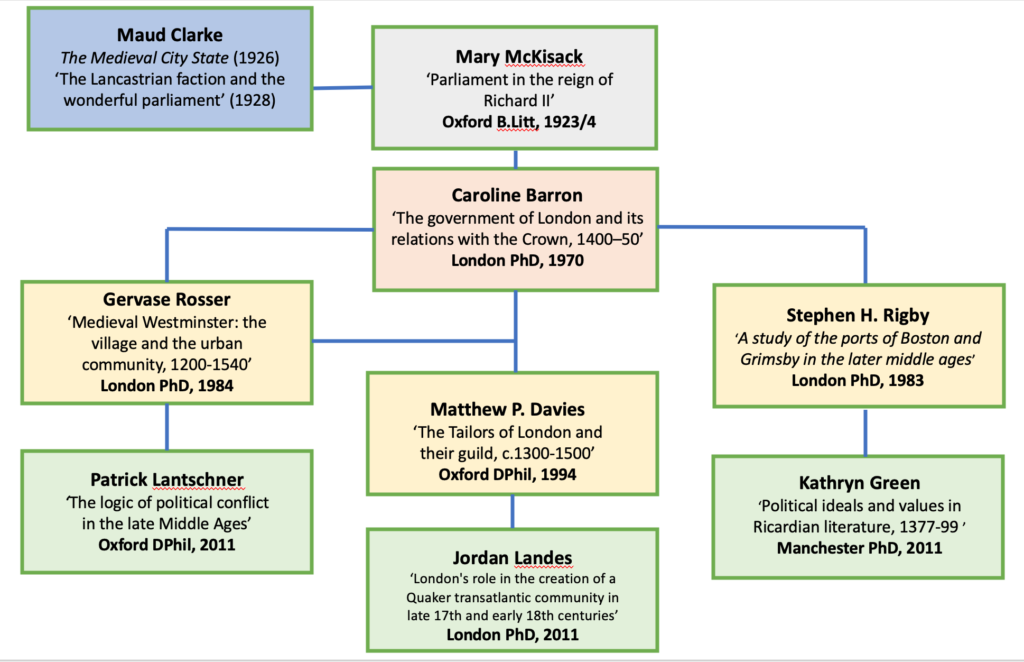
v. What comes after the PhD?
Of course, for many researchers a PhD thesis is just the start, serving as their gateway to a first book and other publications. What comes after the PhD is now often well-documented via a range of accompanying online resources that help us trace the development of a historian’s career.
Putting these resources together builds up a richer profile, as we can see in the following example–Tim Reinke-Williams’ 2006 PhD from Warwick University–chosen at random from the list of theses in British history, awarded 2000-09. (Tim is now Senior Lecturer in History at the University of Northampton and our thanks to him for allowing us to use his work as a case study here.)
1. The starting point: Tim Reinke-Williams’ 2006 PhD thesis as listed in BHO, Theses, 1970-2014:
Modern Britain and Ireland, awarded 2000-09

2. Tim’s complete thesis is also available for download via the British Library’s EThOS website

3. Having completed his PhD, Tim went on to publish. Here’s his current publications page in the IHR/RHS
Bibliography of British and Irish History (BBIH) – a subscription resource.
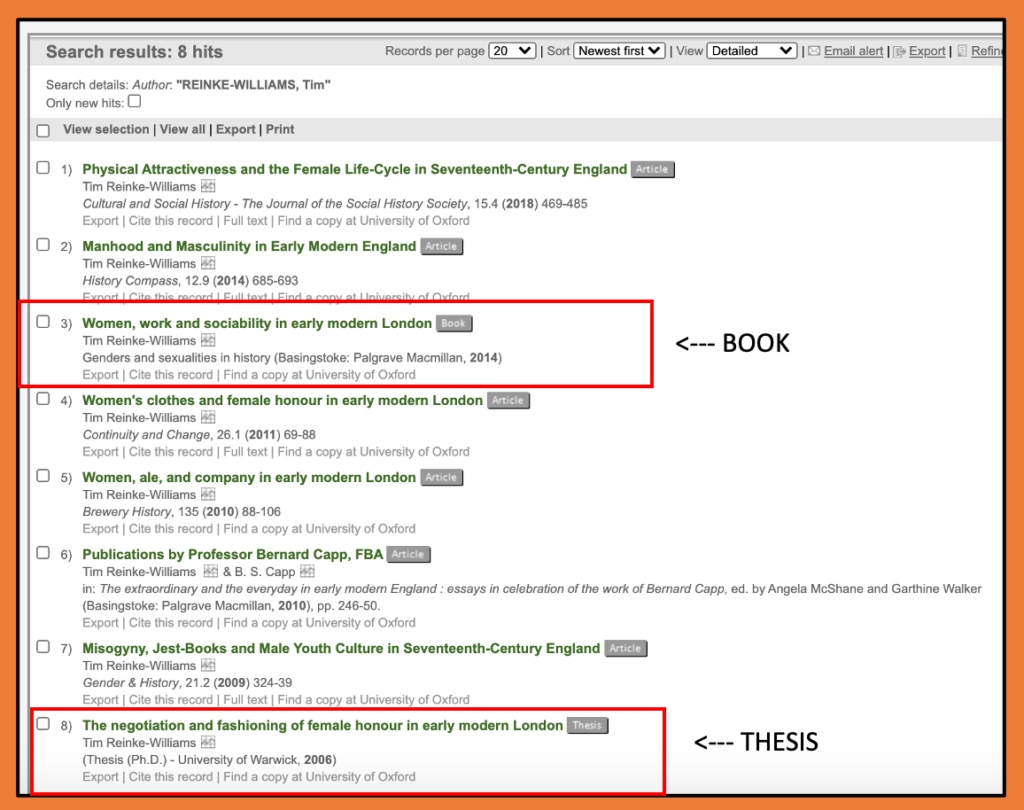
4. The BBIH record includes Tim’s first book (2014) which drew on his PhD research. BBIH adds metadata to allow similar works to be identified, plus links to academic reviews of Tim’s book
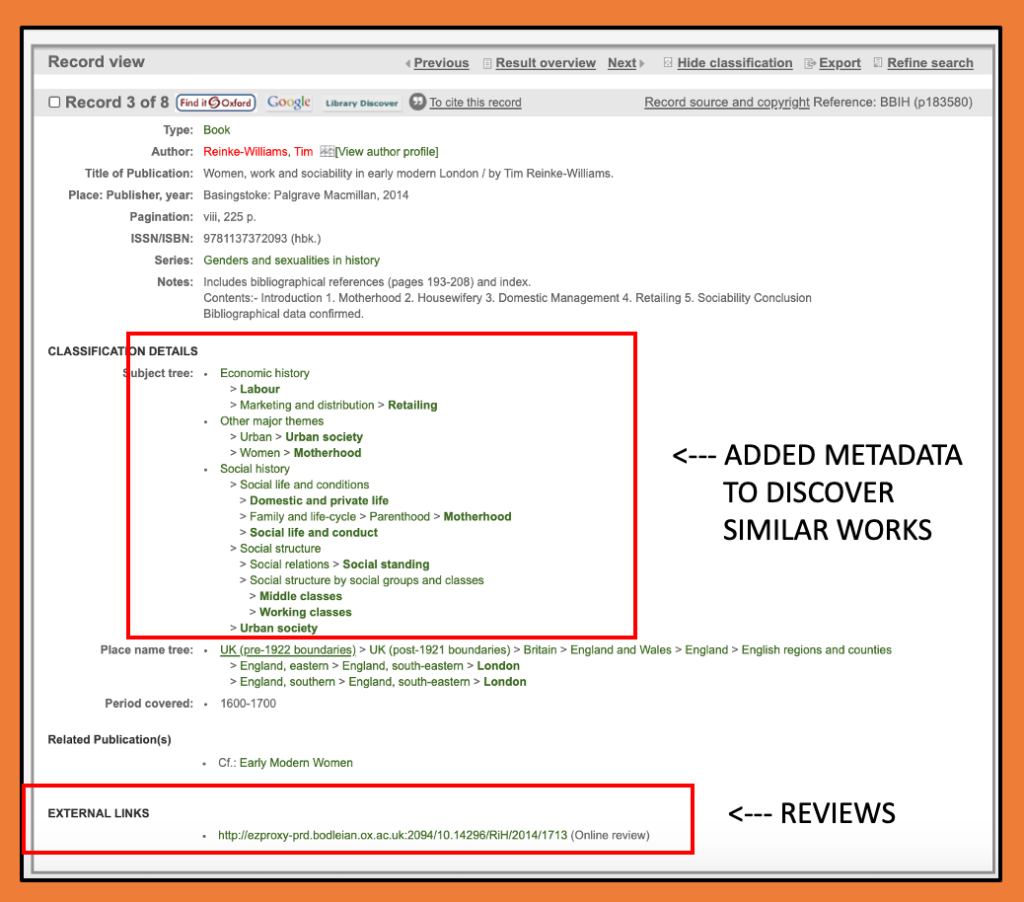
5. Via BBIH, links point to reviews of Tim’s book: here in the IHR’s Reviews in History

6. By connecting the citation to Google Books we also gain access not just to extracts of published text but also to a book’s acknowledgements page.

Here we have sight of a historian’s wider intellectual networks (thanked for their support during the writing of a book), plus — often for first books — reference to PhD examiners who might play a role in developing a research project from thesis to first publication.
In our case study, Tim Reinke-Williams’ examiners were Alex Shepard — who we encountered earlier (‘Meanings of manhood in early modern England‘ 1999) — and Steve Hindle (‘Aspects of the relationship of the state and local society in early modern England, with special reference to Cheshire, c.1590-1630‘ 1993). Via the BHO listing we can in turn find the examiners’ own research students, and discover that both Shepard and Hindle studied for their doctorates under the supervision of Keith Wrightson. Another lineage begins to emerge.
Made at scale, such connections offer intriguing possibilities for charting the intellectual and social networks that shape and inform the profession. We’ll be further considering these possibilities in future posts, and encourage you to have a go when the underlying thesis data is released via a CC licence in early July.
***
About British History Online
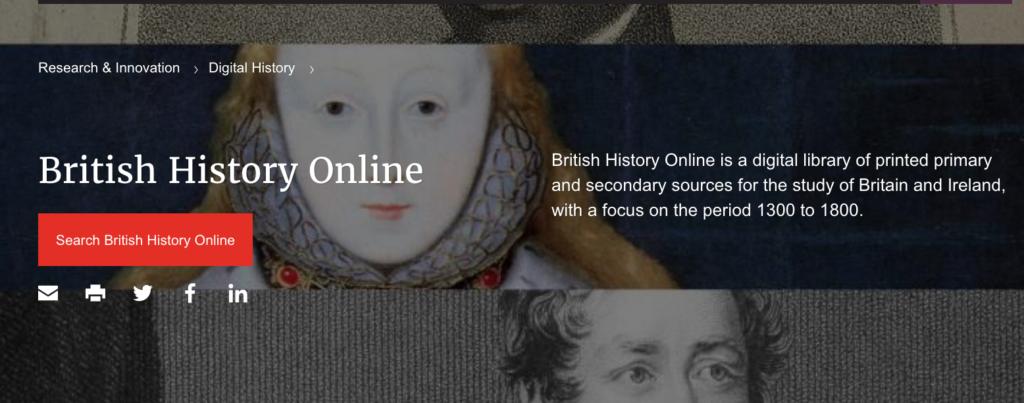
British History Online (BHO) is the IHR’s digital library of nearly 1300 volumes of primary and secondary content, with a focus on British and Irish history, c.1200-1800. BHO is the creation of the Institute of Historical Research, School of Advanced Study, University of London, and is used by students, researchers and teachers, worldwide.
To help researchers at this time, all BHO premium content is currently freely available for individual users until 30 September 2020.
BHO editors are also inviting responses to our 2020 Survey: tell us what you like, and don’t like about British History Online, and what you’d like to added to the service.

Philip Carter is Head of Digital and Publishing at the IHR and Senior Lecturer in British History.

